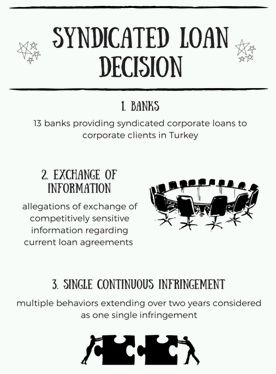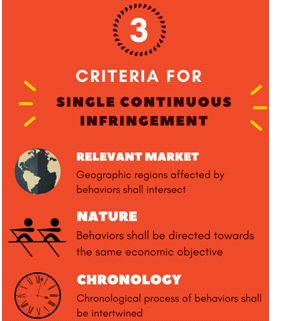
The Turkish Competition Authority's (TCA) approach to determination of a "single continuous infringement" (SCI) is yet to be a consistent one since the TCA is observed to consider different conditions in its precedents. Having evaluated the presence of SCI in a few precedents, the TCA tackles the same concept in yet another decision concerning banks. In late 2017, TCA concluded its investigation initiated to determine whether banks providing syndicated loans to corporate customers in Turkey violated article 4 of the Competition Act by exchanging competitively sensitive information for current loan agreements, including information related to credit terms such as interest rates and credit periods, as well as information related to other financial transactions. The TCA in its reasoned decision,1 established that two banks are party to one single infringement which extends over a period of two years.
What is the concept of a single continuous infringement?
SCI, a concept recognized by both the European Commission and the TCA, allows competition authorities to evaluate a series of infringements under one single conduct. The primary importance determining an SCI is with regard to the calculation of the base fine as per the Regulation on Fines. The foregoing regulation states that the base fine shall be calculated separately for each behavior in case the TCA determines that there is more than one individual behavior. Accordingly, the TCA needs to consider the (i) relevant market, (ii) the nature and (iii) the chronological order of behaviors in establishing the presence of multiple infringements.
SCI also affects the manner in which the burden of proof is perceived. The TCA is generally under the obligation to present proof separately for each infringement in case more than one infringement is determined. However, the TCA is no longer obliged to present proof of each separate behavior, but rather of one single conduct, in case it rules on the presence of SCI.
The findings of the TCA in the decision
The TCA, who determined that exchange of information between two banks extends over a period of two years, decided these multiple behaviors shall be considered as one single continuous infringement. Similar to precedents of the TCA, not allowing a clear understanding of TCA's approach to the concept, the latest syndicated loan decision does not expressly discuss why multiple conduct by investigated banks shall constitute SCI. Instead, the TCA echoes a few of its precedents by also recognizing the decisions of the European Commission while underlining factors to be considered in establishing SCI.
Flakeboard Decision
The TCA initially recalls its Flakeboard decision2 regarding allegations that undertakings violated the Competition Act by determining sales and maturity conditions of flakeboards and fiberboards. In its Flakeboard decision, the TCA establishes that investigated undertakings performed multiple conducts violating the Competition Act, which extend over a period of eight years within the context of one single framework agreement. Given that otherwise is not proven, the TCA decides that a series of agreements between investigated parties constitutes one single agreement.
Doğu Cement Decision
TCA later quotes its Eastern Anatolian Cement Decision3 concerning allegations that cement producers operating in the Eastern and Black Sea regions violated the Competition Act through price-fixing agreements. The TCA in its foregoing decision examines agreements between investigated parties, which are demonstrated through two separate sets of evidences. The TCA resolves that these agreements shall constitute one single infringement since (i) chronological process of behaviors is intertwined, (ii) geographic markets affected by behaviors intersect and (iii) evidencing documents do not indicate two separate infringements.
Polypropylene Decision
The TCA also recalls the Polypropylene decision4 of the Court of Justice of the European Union (Court) where the Court resolves that behaviors (i) conducted within the context of one plan, (ii) directed towards the same economic objective and (iii) extend over a period of time constitute one single infringement. The Court decided that investigated undertakings are party to one general infringement without proving that undertakings attended every single meeting or participated in every single decision-making process. Most importantly, the Court emphasizes European Commission's responsibility to establish that undertakings are (i) willing to contribute to the common objective of distorting competition, (ii) aware that other undertakings are contributing to the common objective as well (or could have at least foreseen the foregoing) and (iii) accept the consequences of partaking in such violation.
Cimenteries Decision
The TCA lastly recalls the Cimenteries decision5 of the European Commission where exchange of price information between two undertakings is examined. In the absence of evidence that the exchange is part of the agreement and is directed towards the same economic objective, the Commission resolves that exchange of information is an infringement separate from the framework agreement.
What did the TCA say in its Syndicated Loan Decision?

Coming back to the syndicated loan decision, the TCA finally examines the fact that investigated behaviors are scattered through a period of two years. In doing so, the TCA recalls its Poultry decision6 where it resolves that a series of agreements constitutes one single infringement as long as they are directed towards the same economic objective. The fact that the continuous infringement was interrupted at certain times concerns only the calculation of the administrative fine.
Without any further assessment, the TCA resolves that two banks are party to one continuous infringement although the exchange of information between the foregoing extends over a period of two years. Despite the lack of a detailed reasoning, we observe that the TCA follows the practice of European Competition Law in which it rules on SCI where multiple acts are directed towards the same economic objective, chronology of acts is intertwined and geographic regions effected by these acts intersect. Accordingly, the fact that the infringement is interrupted at certain times is only considered in calculation of the administrative fine.
Footnotes
1. The decision of the TCA dated 28.11.2017 and numbered 17-39/636-272.
2. The decision of the TCA dated 19.12.2005 and numbered 05-85/1181-335.
3. The decision of the TCA dated 06.04.2012 and numbered 12-17/499-140.
4. Case C-49/92P.
5. Case T-25/95.
6. The decision of the TCA dated 25.11.2009 and numbered 09-57/1393-362.
The content of this article is intended to provide a general guide to the subject matter. Specialist advice should be sought about your specific circumstances.


